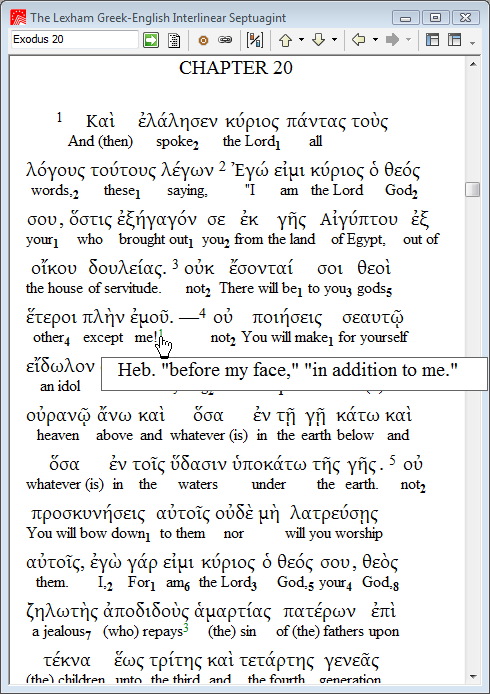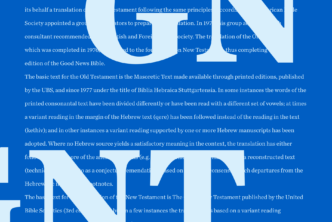The Lexham Greek-English Interlinear Septuagint is a project that we’ve been working on for some time. This is perhaps one of the largest projects we’ve taken on, involving 29 (at present) contributors and two editors (Randall Tan, the General Editor, and David A. deSilva, the Contributing Editor). Several of the contributors have also contributed copious notes covering different text-critical, translational and lexical issues. In this first release, a 20-book portion (see book list below), there are over 6700 notes.
In tandem with the development of the interlinear portions, we have also been working on a new morphology to the Septuagint (LXX) that will accompany the interlinear.
As mentioned on the pre-pub page, our plan all along has been to release portions as they are available. Those who have been Logos customers for awhile may recall that this is how we released the Lexham Hebrew-English Interlinear Bible. There is one resource; as new portions are available the resource will be updated to include those new portions, and released on FTP. Those who have the license simply download the update to get the revised and updated resource.
I’m happy to report that we finally have our first major chunk of The Lexham Greek-English Interlinear Septuagint just about ready to release. There are 20 books of the LXX included in this release. Books fall into two different categories, those in a draft status, and those in an edited status. The draft status means that by and large, the interlinear portions have been completed by the contributor but they have not yet been reviewed by the editor. The edited status means that the interlinear portions have been reviewed by the project general editor.
Books in an edited status are as follows:
- Exodus
- Ruth
- Psalms
- Additional Psalm (Psalm 151)
- Proverbs
- Ecclesiastes
- Song of Solomon
- Obadiah
- Haggai
- Letter of Jeremiah
The following books are in draft status:
- Genesis
- Numbers
- Job
- Jeremiah
- Lamentations
- Ezekiel
- Zechariah
- Malachi
- Baruch
- Psalms of Solomon
The interlinear has seven interlinear lines; these are:
- Manuscript
- Manuscript (Transliterated)
- Greek Lemma
- Greek Lemma (Transliterated)
- Morphology
- English Lexical Value
- English Literal Translation
Why are there two English entries for each word? The Lexham Greek-English Interlinear Septuagint, takes advantage of its digital environment to offer multiple layers of English glosses that reflect the complexity of the Greek language structure. Like the other Lexham interlinears (Hebrew-English Bible and Greek-English NT) there are two levels of interlinear translation. The first is the English Lexical Value, which is a gloss of the lexical or dictionary form of the word. The second is the English Literal Translation, a contextually sensitive gloss of the inflected form of the word. The difference in these glosses is subtle, but powerful. The first gloss answers the question, “What does this word mean?” The second gloss answers the question, “What does this word mean here?”
The English Literal Translation line also includes a word order number, where necessary, to allow the reader to re-assemble the text in an order more friendly to English readers. The below screen capture, with only the Manuscript and English Literal Translation lines shows how helpful this can be:
One would reassemble the text as follows:
1And (then) the Lord spoke all these words, saying, 2“I am the Lord your God who brought you out from the land of Egypt, out of the house of servitude. 3There will be not to you other gods except me! (Exodus 20:1-3)
Somewhat rough, of course, but remember it is an interlinear translation. The goal is make it easier for the LXX to play a role in one’s study of the Bible, both Old Testament and New Testament.
If you haven’t subscribed to this pre-pub already, you may want to consider it sooner than later. Once the first portion ships, the pre-pub will be filled, and then the price will go up.






